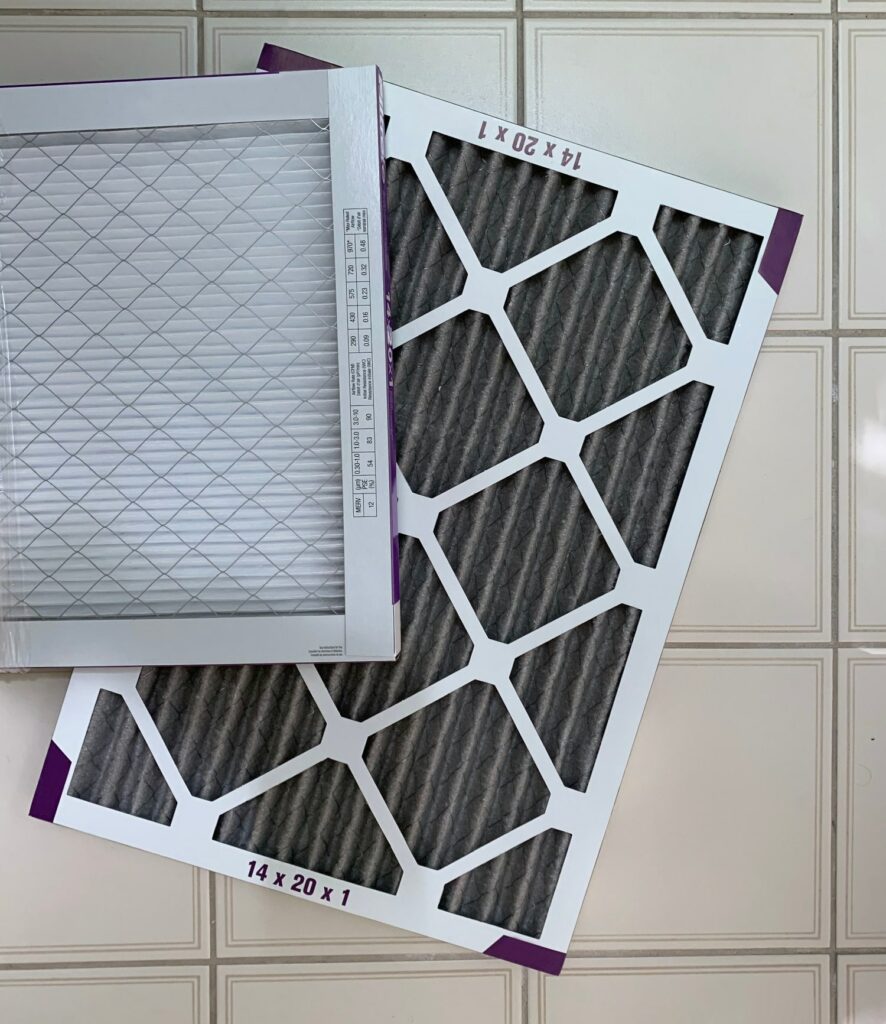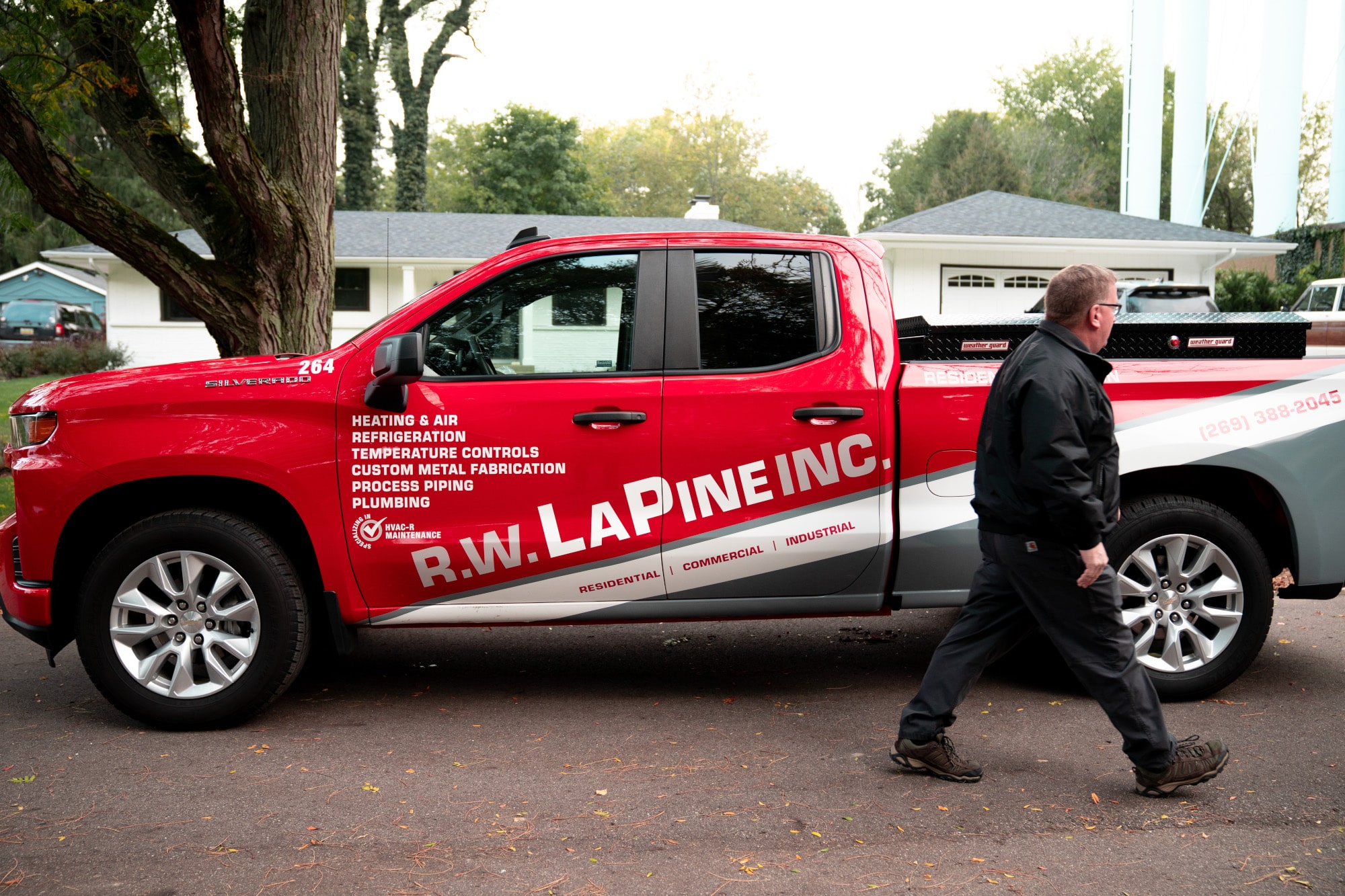Furnace and AC Filter Replacement Calculator
Concerned about your home’s indoor air quality and not sure if it’s time to change your air filter? Use R.W. LaPine’s air filter replacement calculator to estimate your filter’s lifespan.
HVAC Filter Replacement Calculator
When attempting to determine how long your home’s air filter will last, there are a lot of variables to consider. You’ll have to factor in the air filter size, your home’s occupants, where you live, and more. Since your HVAC system is unique, it can be super confusing. And, with so many sources of conflicting information on the Internet, how do you know who you can trust?
Regularly changing AC and furnace filters is crucial to ensuring good air quality in your home. Using dirty filters can lead to poor air filtration, poor circulation, and damaged equipment. So, really, it pays to have a reasonable estimate of how long your filter will last.
For that reason, we’ve created this free air filter replacement calculator. By providing just a little bit of information, it will give you a decent estimate. Of course, it’s only an estimate. For a more exact figure, you should consult your equipment’s manual or speak with a professional HVAC technician.
How Our Air Filter Calculator Works
No two air filters are alike, so we’ve taken a few liberties. Whether or not it’s time to replace your air filter depends on a range of factors, so we’ve had to narrow them down. We decided to focus on the most common variables: filter thickness, home size, kids, pets, air quality, and respiratory issues.
Our estimates are based on our years of experience as an HVAC provider in Kalamazoo and on general industry rules of thumb. But, really, it’s exactly that: an estimate, not a recommendation. You should consult your equipment’s manufacturer or a professional to get exact numbers.
Lifespan of AC and Furnace Filters
As we’ve mentioned, a number of variables can affect the life expectancy of your AC or furnace filter. Pets, home size, dust levels, cigarette smoke, and countless other variables can decrease your filter’s lifespan. But, if you’re looking to save money, there are ways to extend it.
What Impacts Filter Lifespan
- Cats and dogs: Pet hair and dander quickly accumulate on your filter, reducing its expected lifespan drastically.
- Children: Kids regularly bring dust, mud, and dirt particles into the home, which can build up on and clog your filter.
- System usage: It probably goes without saying that the more you use your system, the more often you’ll need to replace its filter.
- Outdoor air quality: If you live near construction sites, manufacturing facilities, or other outdoor pollution, your filter will need to be replaced more often.
- Household cleanliness: Dirt, pollen, and debris that have collected on your home’s surfaces can swiftly find their way into your air filter.
Extending Your Filter’s Lifespan
- Vacuum regularly: Dust that’s gathered in your home’s carpet is a top contributor to the shortening of filter lifespan. By vacuuming on a regular basis, you can reduce the amount of dust and dirt that finds its way into your HVAC system.
- Patch your home’s leaks: If outdoor air is able to find its way into your home, it can bring pollen, allergens, and other contaminants that will get trapped in your air filters. And, patching leaks doesn’t just increase your filter’s lifespan, it can boost the efficiency of your entire system.
- Trim and groom pets: To minimize shedding, you should groom and trim any animals that share your home. This will prevent allergy-inducing dander and pet hair from accumulating in your filter.
- Maintain your HVAC system: Schedule annual tune-ups for both your AC and furnace systems to ensure that they’re operating at peak efficiency and, more importantly, that you’re taking proactive steps to prolong their life.
Understanding AC and Furnace Air Filters
Furnace filters are available in a variety of styles. And, depending on your equipment, the best air filter might not be the biggest or the most expensive. To find the right filter for you, it’s best to consult your equipment’s manual or the manufacturer’s website.
Air Filter Sizes
Air filters come in a number of different sizes and dimensions. Our calculator uses the industry’s most common sizes to determine your filter’s lifespan. But, the most common air filter sizes are:
- 14 × 20 × 1
- 16 × 20 × 1
- 16 × 25 × 1
- 20 × 20 × 1
- 20 × 25 × 1
- 30 × 30 × 1
- 20 × 25 × 4
- 16 × 25 × 5
- 20 × 25 × 5
Having trouble finding the correct size for your equipment? Don’t hesitate to contact us.
Types of Air Filters
While it’s important to know the different types of air filters, it’s a broad topic and deserving of its own article. However, the most common furnace filters include:
- Standard Pleated
- Polyester or Fiberglass
- Washable or Replaceable
- Electrostatic
MERV Rating
MERV stands for Minimum Efficiency Reporting Value. It describes a filter’s ability to capture larger particles between 0.3 and 10 microns. Furnace filters with a higher MERV rating are better at removing particles and airborne pollutants.
If indoor air quality is a concern, especially if anyone in your home suffers from respiratory illness, you’ll want a filter with a higher MERV rating.
How to Check Your Existing Air Filter
When installing new air filters, you have to know where they’re located in your HVAC system. In general, you’ll find your filter in one of two places:
- Inside the blower compartment: Your blower compartment is usually accessed via a metal door on the lower portion of your HVAC system.
- Near the air handler: In some cases, your filter will be kept behind a sliding hatch by your air handler, which you’ll find on the top or side of your system.
Before resorting to replacement filters, give your current filter a visual inspection. If you notice any discoloration, debris buildup, or damage to the furnace filter itself, you should plan on replacing it.

Signs Your Air Filter Needs to Be Replaced
When examining your furnace filters, there are a few surefire signs that they need replacing. First, take a look at a new filter – hopefully you have a replacement ready – so that you have a reference point. It’s likely composed of clean, white fibers.
Dirty air filters are gray, tan, or off-white. They’re often covered in visible hair, dirt, and large particles.
If there’s visible build-up on your filter, it’s time to replace it, as continued use of dirty air filters can put a huge strain on your HVAC system. Trust us, it’s always better to replace a $3 filter than a $5,000 furnace.
Consequences of Using a Dirty Air Filter
Higher Energy Costs
One of the first places you’ll notice the impact of a dirty filter is your pocketbook. Dirty furnace filters cause your system to work harder, which results in more gas or electricity consumption. As a result, your HVAC system could use up to 15% more energy, and that directly translates into higher costs.
Poor Air Quality
It’s been a pretty tough year for air quality in Kalamazoo. So, really, you need to take every step you can to safeguard your family from airborne contaminants. If you have anyone in your home with respiratory issues or allergies, you’ll definitely want to change your air filter on a regular schedule.
Mold Growth
On the topic of air quality, your furnace’s filter is an ideal environment for mold. It’s dark, warm, and damp. And, when mold begins to grow on your air filter, it can quickly spread throughout your house, as it travels through your ducts and onto the various surfaces of your home.
Uneven Heating
Ever notice that some parts of your home are noticeably warmer or cooler than other parts? Of course, this could signal a larger issue, but as a first step, changing your air filter may resolve the issue. When your furnace or AC system needs to work harder, it can be difficult for it to reach certain areas of your home, especially if you have multiple floors.
HVAC Equipment Damage
Okay, so we saved the worst for last. Dirty or clogged filters can cause major – and expensive – damage to your HVAC equipment. When airflow is restricted and your system has to work harder, it’s really easy for its components to overheat. When this happens, your furnace’s fan motor, heat exchanger, or pressure switches can fail, which often leads to costly repairs.
Get Help From Kalamazoo’s Best HVAC Team
If you’re unsure about the right size, depth, or type of furnace filter you need, our experts are here to help. Reach out to us today to schedule an appointment for a furnace or AC tune-up.

Ever notice that some parts of your home are noticeably warmer or cooler than other parts? Of course, this could signal a larger issue, but as a first step, changing your air filter may resolve the issue. When your furnace or AC system needs to work harder, it can be difficult for it to reach certain areas of your home, especially if you have multiple floors.
